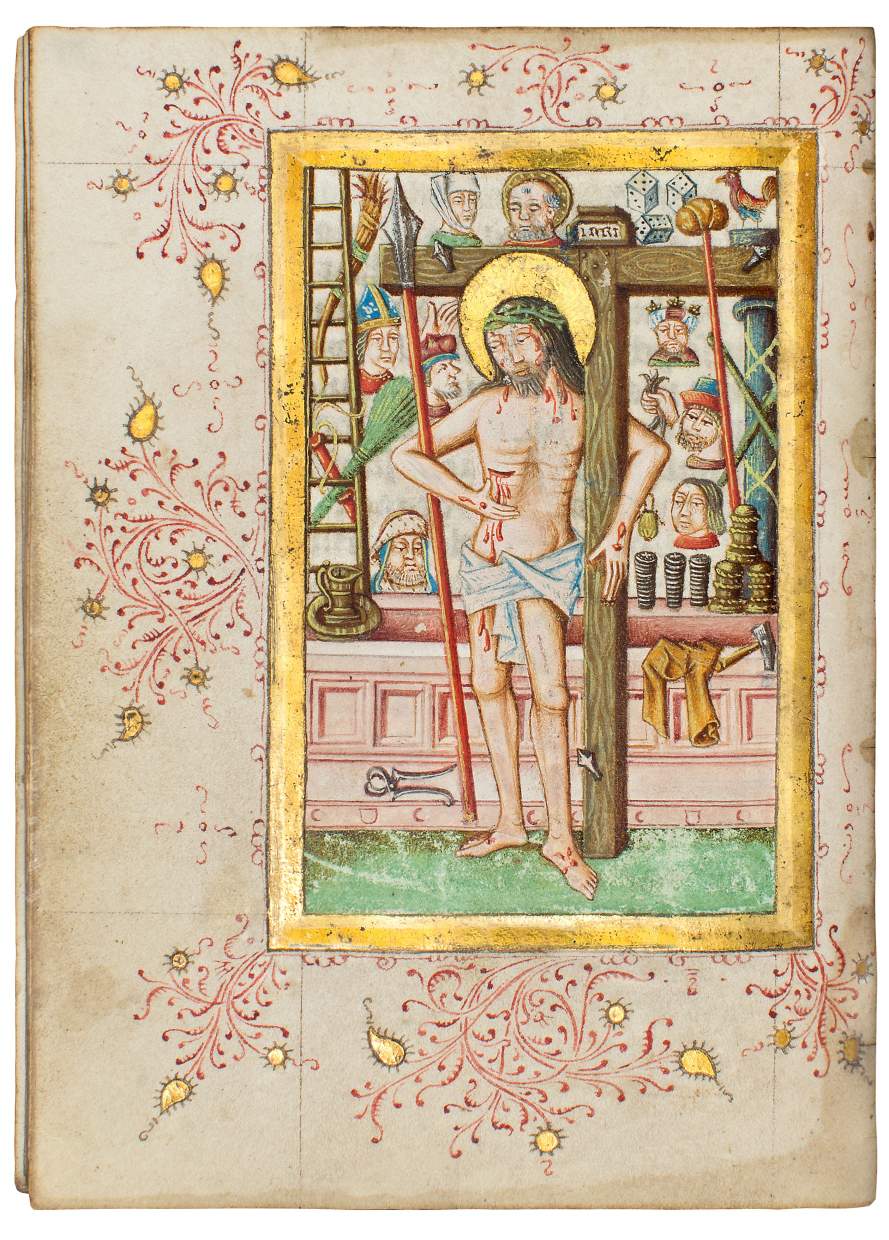-
Kunstwerke / Werke
 CloseGebetbuch im Dialekt von Köln und Umgebung, c. 1486Illuminierte Handschrift auf Pergament.147 x 105 mm. – 188 Blätter. Mit 1 kleineren und 5 ganzseitigen Miniaturen sowie 8 grossen Initialen auf Goldgrund.Hide caption
CloseGebetbuch im Dialekt von Köln und Umgebung, c. 1486Illuminierte Handschrift auf Pergament.147 x 105 mm. – 188 Blätter. Mit 1 kleineren und 5 ganzseitigen Miniaturen sowie 8 grossen Initialen auf Goldgrund.Hide caption
Prayerbook, in the vernacular of Cologne and neighbouring region
Illuminated manuscript on vellum
Germany, Cologne?, c. 1486
147 x 105 mm, 188 leaves,
5 full-page (and 1 smaller) miniatures
f. 44v: Last Judgement
Hide caption Gebetbuch im Dialekt von Köln und UmgebungDeutschland, Köln (?), c. 1486SoldDie Handschrift wurde vermutlich in Köln geschrieben, in der Volkssprache und mit den Lokalheiligen in roter Schrift. Die kodikologischen, linguistischen und textlichen Merkmale dieses Gebetbuchs sprechen ebenfalls für eine Entstehung im niederländisch-deutschen Grenzgebiet des Niederrheins.Illuminated manuscript on vellum.147 x 105 mm. – 188 leaves, with 5 full-page (and 1 smaller) miniatures, 8 large initials in blue or purple on a gold field.1of 3ZurückEin schönes Gebetbuch aus Köln für die private Andacht eines männlichen BesitzersOverview
Gebetbuch im Dialekt von Köln und UmgebungDeutschland, Köln (?), c. 1486SoldDie Handschrift wurde vermutlich in Köln geschrieben, in der Volkssprache und mit den Lokalheiligen in roter Schrift. Die kodikologischen, linguistischen und textlichen Merkmale dieses Gebetbuchs sprechen ebenfalls für eine Entstehung im niederländisch-deutschen Grenzgebiet des Niederrheins.Illuminated manuscript on vellum.147 x 105 mm. – 188 leaves, with 5 full-page (and 1 smaller) miniatures, 8 large initials in blue or purple on a gold field.1of 3ZurückEin schönes Gebetbuch aus Köln für die private Andacht eines männlichen BesitzersOverviewThis manuscript's script, the littera hybrida is a mixture of scripts, combining features of both littera textualis and littera cursive, with a ‘simple’ a and with descending hastes of f and long s, and with straight hastes of b, h, k and l. This script grew to be the ‘national’ script of the Low Countries, where it became most common for books in the circles of the Devotio Moderna (except for liturgical books). This reform movement, which had spread from Deventer since the early 15th century, also influenced texts to a large extent. Their devotees' prayers often ended with a confession of trust in God the Father, Christ, Mary, or a choice of saints and then expressed his or her personal piety. For them, all earthly afflictions were tolerable if only they would lead to eternal glory in heaven. Manuscripts of this type are thus a kind of personal creed, shown here in the ‘ich’ and ‘mijnre’, ‘voir ons’, ‘wir’. The recurrence of male forms suggesting the book was made for a man.
Ideas, usages and texts promoted by the Modern Devotionalists were dispersed via the Congregation of Windesheim – a form of centralized government under a prior general. In Cologne specifically, the Augustinian Canons of the monastery of Herrenleichnam belonged to the Congregation of Windesheim since the middle of the 15th century, and, at the same time, the Fraterhaus of St. Michael zum Weidenbach was a foundation influenced directly by the Brothers of the Common Life in Deventer and Münster. Both houses were involved in manuscript production.
This manuscript's high quality miniatures are executed by two accomplished artists.
This work is now in the collection of the Museum Schnütgen in Cologne.



